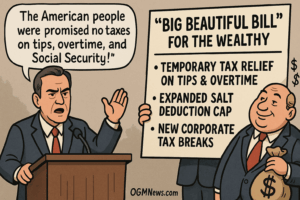The SALT cap, or State and Local Tax cap, is a provision within the U.S. tax code that limits the amount of state and local taxes taxpayers can deduct from their federal taxes. Before 2017, there was no cap, allowing wealthy individuals in high-tax states like California, New York, and New Jersey to subtract significant amounts of property, income, or sales taxes paid to their state or local governments. This provision enabled affluent taxpayers to reduce their federally taxable income by tens of thousands of dollars.
However, the Tax Cuts and Jobs Act (TCJA), signed into law by President Donald Trump in 2017, imposed a $10,000 limit on the SALT deduction, effectively capping how much individuals could deduct in state and local taxes. This change disproportionately impacted high-income households in blue states, which traditionally have higher taxes and offer more government services. According to the Tax Foundation, prior to the cap, 91% of the SALT deduction’s benefits were claimed by taxpayers in states such as California, New York, New Jersey, Illinois, Texas, and Pennsylvania.
Trump’s Shifting Stance on the SALT Cap
Recently, President-elect Donald Trump has expressed openness to raising the SALT cap, a change that has been welcomed by lawmakers from high-tax states. In a meeting with House Republicans from New York, California, and New Jersey, Trump signaled his willingness to raise the cap above the current $10,000 threshold. Representative Mike Lawler of New York, who attended the meeting at Mar-a-Lago, confirmed that Trump is “fully supportive of raising the cap.”
Trump’s stance on the issue aligns with his understanding of the financial burden faced by residents of states like New York. Representative Nicole Malliotakis, also from New York, emphasized that Trump wants to “kill” the SALT cap, recognizing the frustration of taxpayers who feel burdened by local and state tax policies. However, it is reported that Trump is not in favor of completely eliminating the cap, which has been a contentious point in the debate. Economic advisers within the Trump administration have discussed expanding the cap to $20,000 as a potential compromise.
Opposition from Conservative Republicans
The proposal to raise the SALT cap has sparked opposition, particularly among conservative Republicans from lower-tax states. Critics argue that increasing the cap would disproportionately benefit high-tax states, leading to the perception that taxpayers in lower-tax states like South Carolina would be subsidizing the tax policies of states like California and New York. Republican Senator Lindsey Graham of South Carolina voiced this concern, stating that “Why should people in South Carolina subsidize California and New York tax policy?”
In response, Representative Mike Lawler countered that South Carolina is one of the largest recipients of federal dollars, suggesting that the state benefits more from federal funding than it contributes. This ongoing dispute highlights the deep divide between lawmakers from high-tax, predominantly Democratic states and those from low-tax, Republican-leaning states. As President-elect Trump prepares to take office, it remains to be seen how he will navigate these contrasting views to find a solution that satisfies both sides of the political spectrum.
The Political Battle Over the SALT Cap: A Legislative Challenge Ahead
The debate over the SALT cap is far from settled. During the Biden administration, Democrats have repeatedly attempted to eliminate or raise the cap, but their efforts have faced significant hurdles. In 2021, the House passed the Build Back Better plan, which proposed raising the cap to $80,000 until 2031. However, the bill failed to pass the Senate. Additionally, several blue states, including New York and New Jersey, mounted a legal challenge against the SALT cap, arguing that it infringed on their ability to impose state taxes. In April 2022, the U.S. Supreme Court declined to hear the case, leaving the cap intact.
As President Trump prepares to assume office in January 2025, he faces a narrow Republican majority in the House, making it essential for him to negotiate with lawmakers on both sides of the aisle if he hopes to pass a major tax reform bill. The SALT cap debate is expected to be one of the key issues that will shape his tax policy in the coming years. Whether Trump can find common ground with conservative Republicans while addressing the concerns of blue-state lawmakers remains to be seen, but it will undoubtedly be a central issue in the next phase of his presidency.














